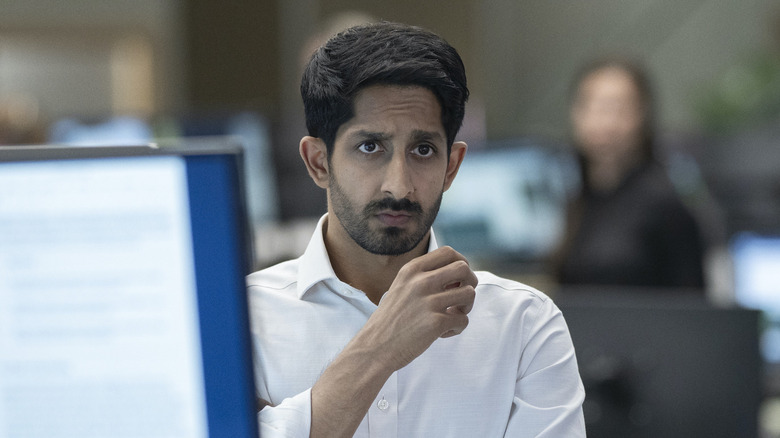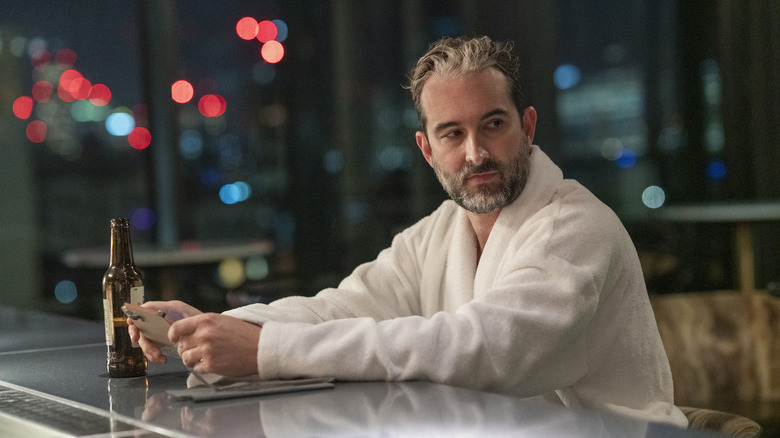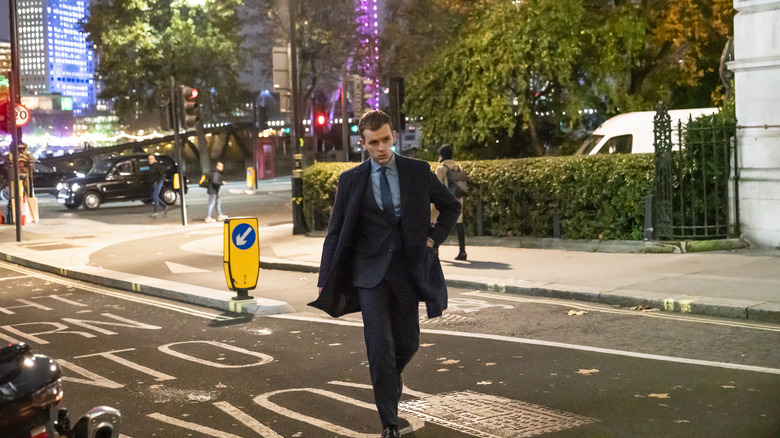The Untold Truth Of Industry
Anyone who hasn't heard of "Industry" is missing out on a contemporary sleeper hit. The HBO series is a workplace drama that follows new employees as they settle into positions at a prominent investment bank in London. Viewers watch the newbies as they make mistakes and discover how to succeed on their own terms, and it's an oddly exhilarating experience. Through this, the show explores the themes of merit and nepotism.
There are plenty of shows about the rich and powerful for viewers to choose from, and as a result, it's not easy to get to the top of the pile, let alone stay there. However, "Industry" does this by allowing the audience to acclimate to the world with the new employees. Of course, these characters don't always make it easy to adore them. Still, everyone can relate to making mistakes at work, and drawing on that relatability is what keeps "Industry" fans tuning in every week.
But how did we end up here? How did Konrad Kay and Mickey Down create one of the finest shows of its time? Let's look under the hood and discover the untold truth of "Industry."
Lena Dunham directed the pilot
Despite increased competition in recent years, HBO remains the primary home of prestige television. Netflix can dominate in terms of quantity. Amazon Prime Video has an advantage when it comes to budgets. Disney has an advantage in terms of intellectual property. However, when the HBO logo flashes up on the screen, it is a guarantee of quality. One way they do this is by constantly looking for new voices and linking those people with well-known and skilled directors. Just look at HBO's excellent pairings of Issa Rae and Prentice Penny for "Insecure" and Lena Dunham and Judd Apatow for "Girls."
HBO sought to replicate this successful formula by bringing back Lena Dunham to helm the pilot of "Industry." When "Industry" was greenlit for an entire series order, Variety reported that the show's producer, Jane Tranter, had praised HBO for never being "afraid to make bold decisions and support new talent." Usually, the onerous task of setting the tone for the rest of a series falls to the pilot episode. So, the choice of Dunham to helm the pilot of "Industry" was at first a little surprising, given the material. When fans finally sat down to watch the series, however, they discovered that it was more about young people adjusting to adult responsibilities, and there is no better person to direct that than Lena Dunham.
The creators are former investment bankers
Mickey Down and Konrad Kay, the co-creators of "Industry," became acquainted while studying at Oxford University the year before the financial crisis of 2008 erupted. At the time, finance was one of the most attractive professional possibilities for ambitious people looking to make a lot of money rapidly. Down was the first to leave his job and enter the film industry, where he rapidly earned a reputation with a buzzy short film. Kay soon joined him, and the producer of "Industry" encouraged them to write a show about ex-bankers from the perspective of a new employee.
Speaking to The Knockturnal, Kay noted that they chose to focus on the time an employee enters an investment bank and needs to traverse the trading floor. He said that his early experiences led him to assume that finance was a meritocracy. However, it wasn't long before many employees understood that their diverse backgrounds, whether socioeconomic or sexual, determined their ceilings in their new roles. This experience was eventually used as a source of content for the series. Writers writing what they know has always been a tried and true means of maintaining authenticity, and to stand out in a crowded field, authenticity is essential.
The soundtrack was inspired by Succession
Talking about "Industry" without discussing "Succession" is like ignoring the elephant in the room. The two shows are about the same world but from different perspectives. While "Succession" concentrates on the upper echelons of society that have lost touch with the average employee, "Industry" follows a more youthful and diverse group of worker bees scheming their way up the corporate ladder. But that is not the sole intersection.
In an interview with Dazed, Nathan Micay, the composer for "Industry," said that one of the soundtracks he was listening to while working on the show was "Succession." What's interesting, however, is that when you listen to the two soundtracks, they have few similarities. The main theme of "Succession" is nigh-on iconic at this point, with lush, booming piano notes that let the audience visualize all the trappings of affluence. Instead, "Industry" opts for lonely electronic music with a melancholy undertone. Both scores are very aware of the show they are representing.
One of the most common misconceptions about soundtracks is that the music is simply added at the end. Micay was very involved from the beginning, and his input actually influenced the final edit. "We started on Episode 1, they sent me version 65 of the cut," he told Crack. "By the time we finished on Episode 1, it was like version 83!"
The show pays homage to Mad Men
Co-creator Mickey Down mentioned on podcast The Watch that he aimed to channel the luscious nature of "Mad Men" with "Industry." He was particularly impressed by the show's ability to transcend what appeared to be a simple story to something more profound. And while it may appear to be a lofty goal to strive towards, "Industry" seems to be getting close.
The secret behind "Mad Men" was always Don Draper's inability to distinguish between who he wanted to be seen as and who he truly was, and how this gradually led to the ruin of his home life while his professional life flourished. Harper Stern (Myha'la Herrold) appears to be on the same path of isolating herself in order to advance at work, regardless of who she has to cross. Harper is fine with it because she knows that winning is all that matters in the money game, and in order for her to win, someone else must lose. Harper doesn't appear to mind being resented, no matter where that resentment comes from.
Eagle eyed viewers may have noticed that "Industry" paid homage to "Mad Men" by finishing an episode with a line inspired by the "Mad Men" episode "Shut the Door. Have a Seat." These parallels between the two shows have a higher goal, though, in that they demonstrate how workplace behavior doesn't really change — backstabbing, greed, and discrimination never go away.
They hired a veteran banker as a consultant
Measure twice and cut once, as the adage goes. That was the approach to developing "Industry" when it came to characters' banter, jargon, and overall cadence. Although Mickey Down and Konrad Kay have a background in investment banking, they wanted to guarantee that the musicality of their dialogue did not turn off people in that sector. "The way people speak to each other on a trading floor, the micropolitics of a sales desk, the way people interact... the language has a very specific cadence," Kay told GQ. "There's a specific sense of humor, there's specific insecurities in that world."
They found the solution to this by bringing Chris Dunne on as a consultant for the series. Before retirement, Dunne worked at JP Morgan and Morgan Stanley. He was a perfect fit for his role in helping the co-creators improve the script and provide periodic rookie financial errors. One of these typical errors proved significant in the first season, so Dunne ended up influencing the plot of the show.
Dunne revealed that although he was familiar with the script, some of the show's big moments still gave him shivers when he watched them — and that is precisely the show's objective. "Industry" draws you into a specific world without any distractions and allows you to empathize with what is essentially just a terrible day at work. This level of precision is typical of HBO — after all, they constructed a whole language for the "Game of Thrones" universe.
Instagram financial meme accounts were used as sources
One of the most interesting parts of "Industry" is that it is set in London. The explanation for this is straightforward: Jane Tranter. Tranter had already established herself as one of the most powerful British television executives in 2009, with significant shows such as "Doctor Who" under her belt. So, when she sought a new challenge, she quit her position at the BBC and launched her own production company (Bad Wolf) with the goal of primarily boosting the local television sector.
However, leaving TV industry politics aside, Mickey Down and Konrad Kay were left with an intriguing issue: Most finance-related TV dramas and movies are not based in London but on Wall Street. GQ asked Kay how they dealt with this predicament, and his response was fascinating. "With Instagram and all of those financial meme accounts, there's a shared sense of humor," he told the mag. Kay and Down came to the realization that virtually everything you needed to confirm can be confirmed on social media.
It's intriguing to examine all of the complex methods the creators used to solve problems — only to discover that they utilized financial meme accounts to figure out how to bridge the cultural divide between London and Wall Street. This is not an indictment of the creators but rather a compliment; often, the simplest solutions are the most efficient.
It's not meant to be a recruitment tool
One of the primary reasons TV dramas and movies on finance have become popular is that society is still reeling from the effects of the 2008 financial meltdown. Films like "The Big Short" and TV dramas like "Billions" are frequently praised for their depictions of finance bros, which are not always pleasant. Filmmakers tend to blister these people, pointing to the crash as evidence of their avarice.
"Industry" does not shy away from this. However, unlike its predecessors, it does not attempt to dilute the jargon, since the writers thought it was necessary to make the audience feel like a fly on the wall. Instead, the show focuses on the little transactions in finance that lay people seldom hear about. As a result, the show slowly chips away at the illusion that the world of finance is, in fact, a meritocracy.
Furthermore, aside from the banking industry excluding persons from historically underrepresented groups, the majority of the characters are simply obnoxious and arrogant. Konrad Kay told GQ that he didn't want "Industry" to be viewed as a recruitment tool for the world of banking, but he also conceded that it doesn't always work that way, as he knows people who read "American Psycho" as students and were inspired to go into finance. "Which tells you a lot about the people I was hanging out with," he added.
HBO brought in the big guns for Season 2
One criticism leveled at "Industry" Season 1 is that it doesn't do enough to distinguish its plot from other shows in the finance subgenre. The debut season was criticized by Sight & Sound, which said that it wasn't clear what new ideas the show had to offer in a review. Nothing turns off a prospective new fan faster than suggesting that a show is unoriginal. Mickey Down, for his part, acknowledged the criticism and told Complex that people were right when they said that the show had "a lot of vibe with not that much story."
One way HBO assisted the creators was by recruiting Jami O'Brien, a veteran of television. O'Brien informed The Knockturnal that she came on board when Season 2 was still being brainstormed. Bringing in O'Brien — who rose to prominence executive producing shows like "Hell on Wheels" and "Fear the Walking Dead" before joining HBO — was a shrewd move that paid dividends. Not that O'Brien's intervention to steady the ship proves that Mickey Down and Konrad Kay lack any knowledge of what they are doing. Other famous shows with first-time showrunners, such as "Lost," have been known to bring in a more seasoned TV executive to guarantee everything runs smoothly. It simply improves the show.
The creators aimed for more character development in Season 2
One of the few drawbacks of the first season of "Industry" was that the writers relied too heavily on the slice of life approach. According to Mickey Down, the show's story didn't really begin until the fifth episode. However, this was not the case with Season 2, as HBO required them to write an intense eight hours of television — in other words, a season devoid of filler episodes.
Filler episodes were common in television before cable and then streaming took over; basically, nothing much changes with the characters' growth or the plot in these episodes. This made more sense before serialized storytelling took over the television medium. In this day and age, if an episode is deemed mundane by the audience, they may never tune in again. The goal is to keep fans guessing about what will happen next week or next season. Konrad Kay believes they accomplished this in Season 2, telling Complex that he believes every episode of the sophomore season outshines the previous one. And the critics agreed: Season 1 has a 76% rating on Rotten Tomatoes while Season 2 has a perfect 100% score at the time of this writing.
One of the most noticeable differences between Season 1 and Season 2 is the writers' emphasis on the characters' inner struggles. Down told Complex that this was done to bring the audience closer to the story rather than just "looking at these characters through a fishbowl."
Jay Duplass made his character more likable
Mickey Down told The Knockturnal that the decision to cast unknown actors in the lead roles was deliberate. They felt that established actors playing insecure new employees on the trading floor would distract the audience. What makes the overall casting choices so brilliant is that the creators chose more recognizable and established actors for the older, more seasoned characters in order to make the power dynamic even more palpable. One standout star in this department is Ken Leung, who plays Eric, Harper's mentor at their prestigious investment bank Pierpoint & Co.
The show truly takes off in Season 2 when Harper meets Jesse (Jay Duplass), an older established hedge fund manager who made a fortune during the COVID-19 pandemic. The creators told Complex that they didn't see Jesse as a Jay Duplass-type to begin with, but the actor managed to turn their dialogue into something more playful and enjoyable with his natural amiability. "You give Jay the most hardened, intricate business dialogue, and he'll turn it into this sort of kind of affable, playful, repartee almost," Down said. "I think the character could have been a bit of a caricature if we didn't have Jay."
The cast were interviewed by real-life financial analysts
HBO goes above and beyond to promote its shows, and the promos are sometimes too entertaining to ignore. For example, the network sat the cast of "Industry" down with the real-life financial analysts who serve as consultants for the show. The analysts interviewed the actors the same way a real-life interviewer would, and they didn't hold back with their questions.
The interviews covered a wide range of topics, from brain teasers about expanding lily pads to multiplication. Although the actors didn't take the interviews seriously, they did provide a small glimpse into how accurate the show's portrayal of the same process really is. Also, from a viewer's perspective, it demystifies that world because the jargon sometimes makes what they do appear so complex and impossible to decipher. The whole process did make one thing clear — the cast of "Industry" is very likable in real life.
Real investment bankers think the show is quite realistic
When The Knockturnal asked Down what he hoped the show's reception would be, he responded that it is not his intention to offend people in finance, but he also hopes that people do not perceive their portrayal of the finance world as propaganda. He made it very clear that their goal was to look at the workplace in the modern era. When Dazed asked actual banking graduates how much the show resembles real life, one praised it for getting the finances right, while another said it accurately portrayed how it feels to work in an office. However, the grads disagreed on the prevalence of drug use.
"Drug culture isn't something that is openly done or spoken about," one person said. "People tend to be private about drug-taking in this day and age, so if they've had a big night out, they'll try to cover it up." This explains the success of "Industry" in a nutshell. The show manages to appeal to a young demographic getting their first feel of the corporate world while not losing focus on the actual world it portrays. Specificity ensures a lack of distraction and the creators honed in on this, particularly in Season 2.
One Season 2 episode was inspired by action movies
Over the course of the first season of "Industry," audiences grew accustomed to Harper and her frustrating self-sabotage. Just as Harper thinks she's got a handle on things, Season 2 kicks in and throws all kinds of roadblocks in her way. The second episode of the sophomore season was so well received by critics and fans alike that Complex sat down with the two writers to learn how they approached writing the episode and what inspired them. Surprisingly, they were inspired by car chase scenes.
"We always wanted to write a banking sequence that felt like a scene from an action movie, as ridiculous as that sounds," Konrad Kay said. "So me and Mick were like, 'Basically, this is gonna be the set piece of Episode 2. It's gonna be the culmination of this storyline with Jesse. We need [it] to feel as exhilarating as a car chase and action sequence.'" The end result is one of the most stressful pieces of television in a long time. The episode completely blew everyone away and remains the best installment of "Industry" to date.













